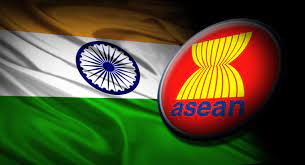
Feedback
Did you find what you were looking for?
Can we ask you a few more questions to help improve the VNTR?
 At the Second ASEAN-India Summit in 2003, the ASEAN-India Framework Agreement on Comprehensive Economic Cooperation was signed by the Leaders of ASEAN and India. The Framework Agreement laid a sound basis for the eventual establishment of an ASEAN-India Regional Trade and Investment Area (RTIA), which includes FTA in goods, services, and investment.
At the Second ASEAN-India Summit in 2003, the ASEAN-India Framework Agreement on Comprehensive Economic Cooperation was signed by the Leaders of ASEAN and India. The Framework Agreement laid a sound basis for the eventual establishment of an ASEAN-India Regional Trade and Investment Area (RTIA), which includes FTA in goods, services, and investment.
ASEAN and India signed the ASEAN-India Trade in Goods (TIG) Agreement in Bangkok on 13 August 2009, after six years of negotiations. The signing of the ASEAN-India Trade in Goods Agreement paves the way for the creation of one of the world’s largest FTAs – a market of almost 1.8 billion people with a combined GDP of US$ 2.8 trillion. The ASEAN-India FTA will see tariff liberalisation of over 90 percent of products traded between the two dynamic regions, including the so-called “special products,” such as palm oil (crude and refined), coffee, black tea and pepper. Tariffs on over 4,000 product lines will be eliminated by 2016, at the earliest. The ASEAN-India TIG Agreement entered into force on 1 January 2010.
Regarding tariffs, India is committed to eliminating tariffs according to the following schedule:
Vietnam committed to eliminate tariffs according to the following schedule:
Framework Agreement on Comprehensive Economic Cooperation
Agreement on Trade in Goods under the Framework Agreement on Comprehensive Economic Cooperation
Schedule Tariff Commitments
Agreement on Trade in Services
Schedule of Specific Commitments
A good is considered to be AIFTA originating if the good is wholly obtained or produced in a Member State, or it meets either of the following conditions:
AIFTA Certificate of Origin is C/O form AI. Currently, 100% of AI form C/O issued by Vietnam and AIFTA members in hard copy. AIFTA only allows correcting errors on the face of C/O (if any errors) but does not allow issuing the replaced C/O. C/O form AI can only be issued during or after (no more than 1 year) the time of export of the goods, not before the time of export like other FTAs. AIFTA does not have a provision on Self-Certification of Origin.
Ministry of Industry and Trade
Disclaimer: All information on this website is presented for consulation purpose only and does not constitute legal advice. All legal responsibility rests solely on the user. Users should not act upon any information obtained through this website without prior verigication with competent national authorities.
The website has been developed under Web Content Accessibility Guidlines (WCAG) 2
Viet Nam Ministry of Industry and Trade. All rights reserved.

Did you find what you were looking for?
Can we ask you a few more questions to help improve the VNTR?

0 of 12 answered


